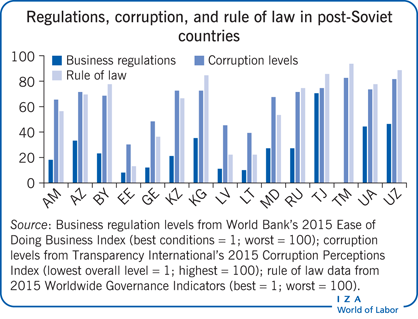Elevator pitch
Supportive institutional environments help build the foundations for innovative and productive entrepreneurship. A few post-Soviet countries have benefitted from international integration through EU membership, which enabled the development of democracy and free market principles. However, many post-Soviet economies continue to face high levels of corruption, complex business regulations, weak rule of law and uncertain property rights. For them, international integration can provide the needed support to push through unpopular yet necessary stages of the reform process.

Key findings
Pros
International integration such as EU membership enables member countries to enact the reforms needed for productive entrepreneurship.
Globalization and cross-border mobility to advanced market economies can facilitate productive entrepreneurial development, even in less supportive institutional environments.
Online technology entrepreneurship offers new opportunities for entrepreneurial success in post-Soviet countries.
Increasing numbers of productive entrepreneurs can support sustained institutional reform.
Cons
The Soviet legacy of negative attitudes and restrictive policies towards entrepreneurship continues to shape institutions in a number of post-Soviet countries.
High levels of corruption undermine productive entrepreneurial development and institutional reform.
Established networks inherited from the Soviet system disproportionately benefit elites and do not foster broader entrepreneurial development.
Weak institutional environments stunt business growth and drive entrepreneurs to operate in the informal sector.